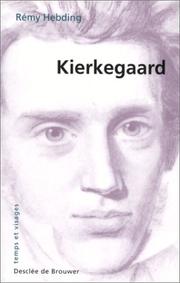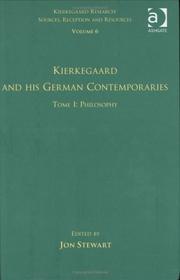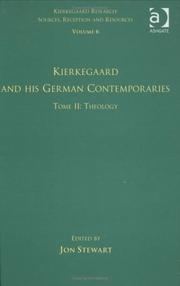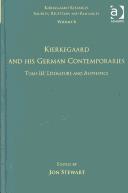| Listing 1 - 10 of 109 | << page >> |
Sort by
|
Book
ISBN: 1461731771 1299133576 9781461731771 0810875845 9780810875845 Year: 2010 Publisher: Lanham
Abstract | Keywords | Export | Availability | Bookmark
 Loading...
Loading...Choose an application
- Reference Manager
- EndNote
- RefWorks (Direct export to RefWorks)
The A to Z of Kierkegaard's Philosophy provides a contextual introduction to Kierkegaard's 19th century world of Copenhagen, a chronology of events and key figures in his life, as well as definitions of the key systems of his thought-theology, existentialism, literature, and psychology. The extensive bibliographical section covers secondary literature and electronic materials of help to researchers. The appendix includes detailed information on his writings, along with a list of his pseudonyms.
Philosophy, Modern --- Kierkegaard, Søren, --- Kierkegaard, Sren,

ISBN: 2220045129 9782220045122 Year: 1999 Publisher: Paris : Desclée de Brouwer,
Abstract | Keywords | Export | Availability | Bookmark
 Loading...
Loading...Choose an application
- Reference Manager
- EndNote
- RefWorks (Direct export to RefWorks)
Kierkegaard, Sren, --- Kierkegaard, Søren, --- Kierkegaard, Søren, - 1813-1855

ISBN: 9780754661825 9781315234588 9781351874472 9781138273269 0754661822 Year: 2007 Volume: 6/1 Publisher: Aldershot Ashgate
Abstract | Keywords | Export | Availability | Bookmark
 Loading...
Loading...Choose an application
- Reference Manager
- EndNote
- RefWorks (Direct export to RefWorks)
This volume explores in detail Kierkegaard's various relations to his German contemporaries. Kierkegaard read German fluently and made extensive use of the writings of German-speaking authors. Apart from his contemporary Danish sources, the German sources were probably the most important in the development of his thought generally. This volume represents source-work research dedicated to tracing Kierkegaard's readings and use of the various German-speaking authors in the different fields in a way that is as clearly documented as possible.The volume has been divided into three tomes reflecting Kierkegaard's main areas of interest with regard to the German-speaking sources, namely, philosophy, theology and a more loosely conceived category, which has here been designated "literature and aesthetics." This first tome treats the German philosophical influences on Kierkegaard. The dependence of Danish philosophy on German philosophy is beyond question. In a book review in his Hegelian journal Perseus, the poet, playwright and critic, Johan Ludvig Heiberg laments the sad state of philosophy in Denmark, while lauding German speculative philosophy. Moreover, Kierkegaard's lifelong enemy, the theologian Hans Lassen Martensen claims without exaggeration that the Danish systems of philosophy can be regarded as the "disjecta membra" of earlier German systems. All of the major German idealist philosophers made an impact in Denmark: Kant, Fichte, Schelling, and most significantly, Hegel. Kierkegaard was widely read in the German philosophical literature, which he made use of in countless ways throughout his authorship.
Kierkegaard, Sren, --- Kierkegaard, Søren, --- Kierkegaard, Søren, - 1813-1855

ISBN: 9780754661320 9781315234571 9781351874441 9781138273627 0754661326 Year: 2007 Volume: 6/2 Publisher: Aldershot Ashgate
Abstract | Keywords | Export | Availability | Bookmark
 Loading...
Loading...Choose an application
- Reference Manager
- EndNote
- RefWorks (Direct export to RefWorks)
This volume explores in detail Kierkegaard's various relations to his German contemporaries. Kierkegaard read German fluently and made extensive use of the writings of German-speaking authors. Apart from his contemporary Danish sources, the German sources were probably the most important in the development of his thought generally. This volume represents source-work research dedicated to tracing Kierkegaard's readings and use of the various German-speaking authors in the different fields in a way that is as clearly documented as possible. The volume has been divided into three tomes reflecting Kierkegaard's main areas of interest with regard to the German-speaking sources, namely, philosophy, theology and a more loosely conceived category, which has here been designated "literature and aesthetics." This second tome of the present volume is dedicated to Kierkegaard's main theological influences. In theology the German and the Danish traditions had long been closely connected via their common source: Luther. In Kierkegaard's time the main influence on theology was probably German philosophy and specifically Hegelianism. Most of the German theologians were in some way in a critical dialogue with this movement. Another important influence was Schleiermacher, who visited Copenhagen in 1833 and was important for several Golden Age thinkers. From his student days Kierkegaard kept abreast of the German theological literature, from which he drew much inspiration.
Kierkegaard, Sren, --- Kierkegaard, Søren, --- Kierkegaard, Søren, - 1813-1855

ISBN: 9780754662860 9781315234564 9781351874410 9781138265608 0754662861 Year: 2007 Volume: 6/3 Publisher: Aldershot Ashgate
Abstract | Keywords | Export | Availability | Bookmark
 Loading...
Loading...Choose an application
- Reference Manager
- EndNote
- RefWorks (Direct export to RefWorks)
This volume explores in detail Kierkegaard's various relations to his German contemporaries. Kierkegaard read German fluently and made extensive use of the writings of German-speaking authors. It can certainly be argued that, apart from his contemporary Danish sources, the German sources were probably the most important in the development of his thought generally. The volume has been divided into three tomes reflecting Kierkegaard's main areas of interest with regard to the German-speaking sources, namely, philosophy, theology and a more loosely conceived category, which has here been designated "literature and aesthetics." This third tome is dedicated to the German literary sources that were significant for Kierkegaard; in particular the work of authors from German Classicism and Romanticism. Important forerunners for many of Kierkegaard's literary motifs and characters can be found in the German literature of the day. His use of pseudonyms and his interest in irony were both profoundly influenced by German Romanticism. This volume demonstrates the extent to which Kierkegaard's views of criticism and aesthetics were decisively shaped by the work of German authors.
Kierkegaard, Sren, --- Kierkegaard, Søren, --- Kierkegaard, Søren, - 1813-1855
Book
ISBN: 9780754663508 0754663507 Year: 2008 Volume: 8/2 Publisher: London Ashgate
Abstract | Keywords | Export | Availability | Bookmark
 Loading...
Loading...Choose an application
- Reference Manager
- EndNote
- RefWorks (Direct export to RefWorks)
Although Kierkegaard's reception was initially more or less limited to Scandinavia, it has for a long time now been a highly international affair. As his writings were translated into different languages his reputation spread, and he became read more and more by people increasingly distant from his native Denmark. While in Scandinavia, the attack on the Church in the last years of his life became something of a cause célèbre, later, many different aspects of his work became the object of serious scholarly investigation well beyond the original northern borders. As his reputation grew, he was co-opted by a number of different philosophical and religious movements in different contexts throughout the world. The three tomes of this volume attempt to record the history of this reception according to national and linguistic categories. Tome II covers the reception of Kierkegaard in Southern, Central and Eastern Europe. The first set of articles, under the rubric 'Southern Europe', covers Portugal, Spain and Italy. A number of common features were shared in these countries' reception of Kierkegaard, including a Catholic cultural context and a debt to the French reception. The next rubric covers the rather heterogeneous group of countries designated here as 'Central Europe': Hungary, the Czech Republic, Slovakia and Poland. These countries are loosely bound in a cultural sense by their former affiliation with the Habsburg Empire and in a religious sense by their shared Catholicism. Finally, the Orthodox countries of 'Eastern Europe' are represented with articles on Russia, Bulgaria, Serbia and Montenegro, Macedonia and Romania.
Kierkegaard, Sren, --- Kierkegaard, Søren, --- Kierkegaard, Søren, - 1813-1855

ISBN: 1282858912 9786612858918 0773568743 9780773568747 9780773521018 0773521011 Year: 2001 Publisher: Montreal Ithaca McGill-Queen's University Press
Abstract | Keywords | Export | Availability | Bookmark
 Loading...
Loading...Choose an application
- Reference Manager
- EndNote
- RefWorks (Direct export to RefWorks)
He shows us that Kierkegaard's expressed intent is to provide readers with the opportunity to choose or reject Christ. He explores the question of who Kierkegaard understands Jesus to be and why he believes that faith or history alone cannot answer this question, claiming that history is meaningful only when it is understood from the perspective of "sacred history." Kierkegaard's Livingroom explores what "sacred history" is, why it is so important to us, and why it depends on an incarnate God. Mercer argues that Kierkegaard is not tilting at windmills but responding to Hegel's view of history and Kant's view of faith, showing that Kierkegaard has much to contribute to the debates on liberalism and post-modernism.
History --- Christianity --- Religions --- Church history --- Philosophy --- Kierkegaard, Søren, --- Kierkegaard, Sren,
Book
ISBN: 0691642680 140085394X 0691615152 9781400853946 Year: 2014 Publisher: Princeton, NJ
Abstract | Keywords | Export | Availability | Bookmark
 Loading...
Loading...Choose an application
- Reference Manager
- EndNote
- RefWorks (Direct export to RefWorks)
In contrast to those critics who consistently have accused Soren Kierkegaard of neglecting the social dimension of human life, John Elrod holds that in those books written after the publication of Concluding Unscientific Postscript Kierkegaard turned his attention to the social and political issues of nineteenth-century Denmark.Originally published in 1981.The Princeton Legacy Library uses the latest print-on-demand technology to again make available previously out-of-print books from the distinguished backlist of Princeton University Press. These editions preserve the original texts of these important books while presenting them in durable paperback and hardcover editions. The goal of the Princeton Legacy Library is to vastly increase access to the rich scholarly heritage found in the thousands of books published by Princeton University Press since its founding in 1905.
Self (Philosophy) --- Christianity --- Philosophy --- Philosophy. --- Kierkegaard, Soren, --- Kierkegaard, Sren,
Book
ISBN: 9781400868629 1400868629 9780691618630 9780691071664 0691618631 Year: 2015 Publisher: Princeton, NJ
Abstract | Keywords | Export | Availability | Bookmark
 Loading...
Loading...Choose an application
- Reference Manager
- EndNote
- RefWorks (Direct export to RefWorks)
Kierkegaard's pseudonymous authorship has baffled readers, his apparent capriciousness making it difficult to determine his position at a given point and to understand his work as an organic whole. Gregor Malantschuk's study, based on careful reading of Kierkegaard's journals, papers, and texts, cuts through the authorship problem to clarify the philosopher's key ideas, see the comprehensive plan of his work, and make intelligible the dialectical coherence of his thought. Discussing Kierkegaard's dialectical method and his use of it from Either/Or to the final Two Discourses, Professor Malantschuk shows how coherently Kierkegaard set the individual works in place, so that even the conflict between the principal pseudonyms, Climacus and Anti-Climacus, serves to elucidate his major philosophical ideas. Contents: 1. Anthropological Contemplation. II. Kierkegaard's Dialectical Method. III. The Dialectic Employed in the Authorship. Index.Originally published in 1971.The Princeton Legacy Library uses the latest print-on-demand technology to again make available previously out-of-print books from the distinguished backlist of Princeton University Press. These editions preserve the original texts of these important books while presenting them in durable paperback and hardcover editions. The goal of the Princeton Legacy Library is to vastly increase access to the rich scholarly heritage found in the thousands of books published by Princeton University Press since its founding in 1905.
Dialectic. --- Polarity --- Polarity (Philosophy) --- Kierkegaard, Soren, --- Kierkegaard, Sren,
Book
ISBN: 0191611840 1283915367 9780191611841 9780191745553 0191745553 9781283915366 9780199698677 0199698678 Year: 2013 Publisher: Oxford Oxford University Press
Abstract | Keywords | Export | Availability | Bookmark
 Loading...
Loading...Choose an application
- Reference Manager
- EndNote
- RefWorks (Direct export to RefWorks)
This book shows Kierkegaard's role in literary, religious, and political movements associated with romanticism, modernism and existentialism. It explores his background in romantic literature and his response to aspects of contemporary urban culture and goes on to show how his influence fed into various currents of twentieth century thought.
Romanticism. --- Modernism (Literature) --- Kierkegaard, Søren, --- Kierkegaard, Sren, --- Kierkegaard, Søren
| Listing 1 - 10 of 109 | << page >> |
Sort by
|

 Search
Search Feedback
Feedback About UniCat
About UniCat  Help
Help News
News